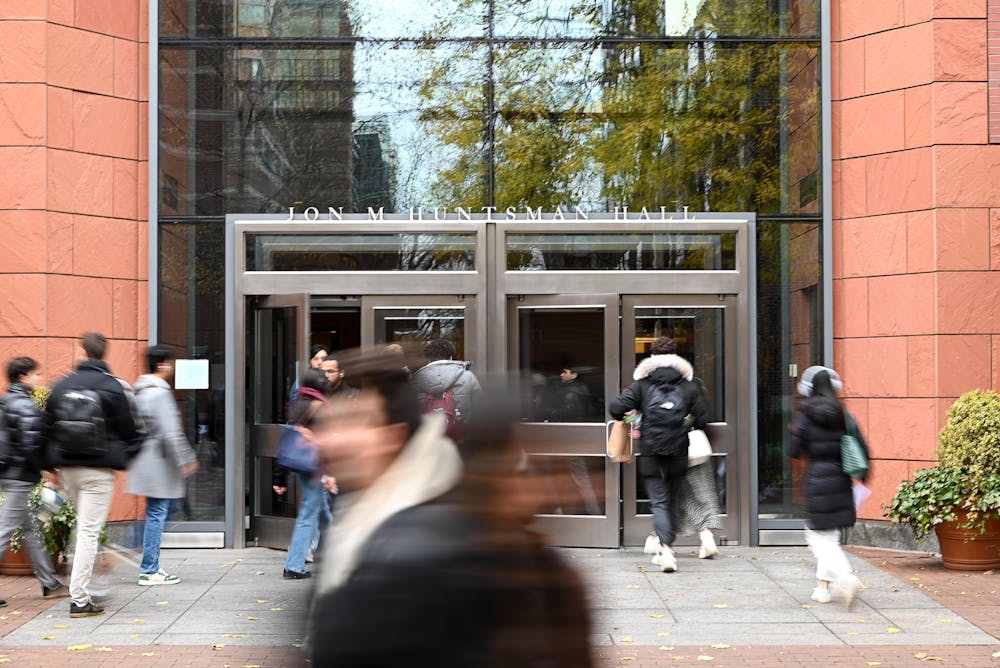“Welcome to Penn! You are the most diverse class we ever admitted!” The convocation rhetoric makes you feel so special. Penn is diverse because a student comes from Wisconsin and another from Kazakhstan. One plays the flute, one plays squash. Never mind that all of them want to be bankers or consultants. I wish someone had told me that nearly every other person sitting at Convocation with me would end up in the funnel. That however diverse my first-year class was, my senior class would simply not be.
As a teaching assistant for Wharton’s required “Business and You” leadership course, I mentor first years adjusting to college and exploring careers. Someone confessed, “If not banking, then what else could I possibly do?” If the best business school in the world (U.S. News debates aside) makes you believe you only have one option from day one, the institution, culture, and entire system have fundamentally failed.
Of course, there is nothing wrong with those jobs: The last thing we need is a trembling economic system and inefficient markets. The problem is blindly assuming that one in two employed Penn grads and 80% of Wharton grads woke up and consciously made such a decision. Unpacking our culture proves how little of a decision this is and how everything revolves around two words: prestige and control.
It is common knowledge by now that Penn students are privileged. However, you may not know that for every single student from the bottom 20%, over 21 people come from the top 20%, blithely offsetting their upbringing. The result? An abject elite detached from reality. Okay, perhaps this is cynical, but if we are known for our elitist “seeing and being seen” culture, is it a surprise that 25% of us are so disillusioned to think the average U.S. salary is above six figures? Of course not (both not surprising and not true).
Penn’s alarming lack of socioeconomic diversity (despite efforts acknowledged this) unequivocally creates a culture perpetuating the value of money at the expense of everything else. The people you sit next to in class distract you with their laptop screens: purchasing a Gucci bag or booking Airbnbs in Cancun. The emails you receive are about banking and consulting events. This is the model. The only one. The only one, right?
Let’s be honest, “just follow your passion” won’t pay the bills, and I cannot blame an indebted or underprivileged student for desiring financial freedom with a high-paying job. This is why I am not saying the Wall Street lifestyle is unethical, although like others, I could. I am saying this is only one way to live your life. One of infinitely many. Which one makes sense for YOU?
Everyone at Penn is good at planning, several are good at doing, and almost none are good at reflecting. The purpose of your college education is not exclusively career preparation. If this is what they had you do, I hate to tell you that you have been robbed. As writer William Deresiewicz argues, “What you should want to develop in college is the habit of reflection, which means the capacity for change because most of what you come across in college will inevitably fade from memory. What is left over, precisely, is you.” A culture, even more so an institution, should give you the tools to understand what model of life you want to live, not impose the model on you.
Yet, my student's question is central and inevitable: What else if not banking?
Asking yourself what truly energizes you is no easy task, because it requires the vulnerability to let go of the comforting lifetime certainty that the predetermined path gives you: 2025 summer recruiting, analyst, associate … Well, the desire to eliminate uncertainty eliminates life. What do you plan to do after “some years of experience” with your future free time and why on earth are you not doing it now?
In his book “Excellent Sheep,” Deresiewicz advocates for the importance of time off, slowing down, breaking the cycle of endless achievement, and acknowledging the existence of a world outside of your Ivy League. It may be scandalous to some and unmistakable to others, but what if you replaced your obsessive passion for finance with one that is harmonious, perhaps exploring capacities you have not had a chance to cultivate? What if you did something you purposefully cannot put on a resume or post on LinkedIn? Yes, you may be “behind” those who doubtlessly persist in the hierarchy, but what is the purpose of being at the top if you are climbing the wrong mountain?
The main idea behind the Pathless Path is not to neglect the ambition that got us where we are (not even to stop using Path@Penn), but rather to remember that Penn is not a four-year treadmill to (and playground for) the American elite. Yes, it was founded for them, but Penn’s core mission today is the pursuit, enhancement, and dissemination of knowledge. We need to be aware of and manage our bewitching instinct to desire control and the social need for status. The truth is you cannot eradicate control and prestige. Just stop watering them. Like the French say, “lâcher prise.”
Liberal education puts everything at risk and requires you to risk everything. The process is by no means comfortable, but it is liberating and extraordinary. If it happens right, it feels like giving birth to yourself. Or at least this is how I feel and the only obsession I have is ensuring everyone gets not the opportunity, but rather the choice of feeling this way, too.
FRANCESCO SALAMONE is a Wharton sophomore from Palermo, Italy. His email address is frasala@wharton.upenn.edu.









